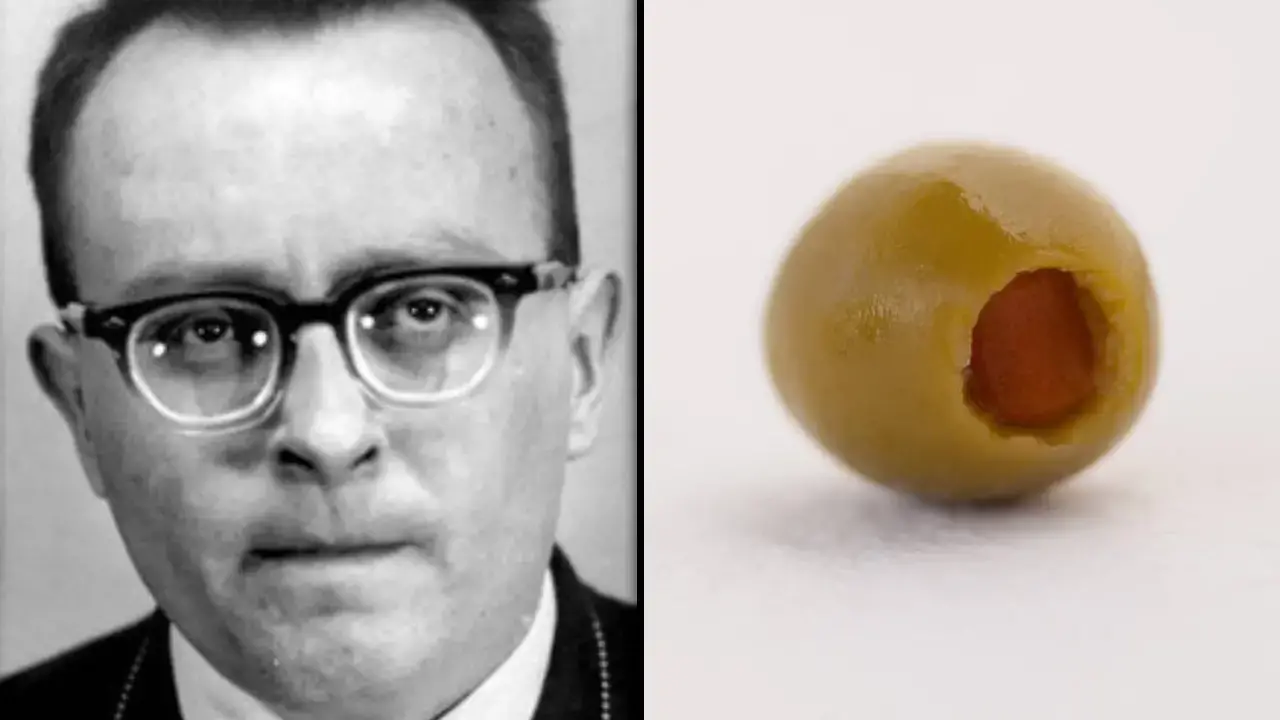
Credit: Iowa Police & Alamy
Chilling Reason Death Row Inmate Chose A Single Olive For His Final Meal
In the records of history, the brief and troubled life of death row inmate Victor Feguer would have likely faded into obscurity for most people.
But one detail of his life stands out – his peculiar last meal request. Before his execution, he asked for a single olive, pit intact.
This unusual final meal, coupled with his mysterious demeanour, makes Feguer a figure of intrigue.
Feguer’s life was plagued with darkness and mental illness. His crimes were chilling, yet he remained enigmatic.
Related Article: Death Row Inmate Suffered ‘Excruciating’ Death After Making Last Meal ‘Mistake’
Related Article: Death Row Inmate Made Extravagant Request For Last Meal Of 11 Different Items Before Being Killed
At 28 years old, he committed a heinous murder without any apparent motive.
He called a doctor under the guise of needing medical help for his fictional wife, luring him into the woods where he shot him dead.
Feguer’s history of mental illness was known and a prison psychiatrist had diagnosed him as a paranoid schizophrenic.
He had spent most of his life behind bars since age 13, plagued by a troubled mind and criminal tendencies.
During his trial, Feguer offered no explanation for his actions, leaving a trail of questions and a sense of mystique surrounding his motives.
He seemed to live in a world of his own, and his silence only deepened the mystery.
In the end, the evidence against Feguer was overwhelming, and the jury found him guilty.
Despite efforts from Iowa Governor Harold Hughes to appeal to President John F. Kennedy for a commutation, the sentence was carried out.
@unsolvedproductions Victor Feguer’s last meal request ‼️ #fyp #podcast #truecrime #story #inmate #lastmeal ♬ Chamber of Reflection (Live Cover) – Your Anxiety Buddy
On March 15, 1963, Feguer was executed by hanging, becoming the last person executed by the federal government for an astonishing 38 years.
For the last meal before his death, Feguer requested an olive, an olive with its pit intact, to be precise.
This seemingly simple request held an underlying meaning for him.
Feguer expressed his hope that an olive tree would grow from his grave as a symbol of peace.
It was a stark contrast to the darkness of his actions and the turmoil within his mind.
The meal was brought to life by photographer Henry Hargreaves in his collection No Seconds, in which he snapped recreations of the final meals.
The photo of Feguer’s meal was his favourite, as he explained to CBS News.
Hargreaves told the outlet: “It’s just such a polarising image.
“We think about last meals, and is it something that’s going to be totally gluttonous, and then he just has a single olive.
“You know, it’s so simple, beautiful and kind of final. It’s like a full stop at the end of his life.”

As Feguer faced his final moments, a sense of closure came for those involved in the case.
His court-appointed attorney, Fred White, who had tried in vain to understand Feguer’s psyche, was relieved that the ordeal was over.
White had done everything in his power to represent Feguer, but he could never fully comprehend the complexity of the troubled man.
In the years that followed, Feguer’s case would be etched into history as the last federal execution until McVeigh’s imminent fate.
The death penalty landscape had evolved over time, with states revising their laws to address concerns raised by the US Supreme Court.
Related Article: Woman Executed On Death Row Performed Defiant Final Act Before Her Death
Related Article: Death Row Murderer Dies 13 Minutes After Lethal Injections And Utters Chilling Final Words
While the federal death penalty law became more extensive, federal executions remained a fraction of those carried out by states.
As White continued his law practice, the memory of Feguer lingered.
He couldn’t forget the heinous crime his client committed, nor could he shake the feeling of sorrow for Feguer’s troubled mind.
The man he represented was mentally unwell, and White’s heart ached for all involved, including the victim’s family.
The story of Victor Feguer may be one of darkness and mystery, but it also sheds light on the complexities of the human mind and the judicial system.
His final meal of an olive, with its symbolic hope for peace, leaves us contemplating the depth of his troubled soul and the tragic path he took in life.
While history has recorded his dark deeds, the olive remains a poignant reminder of a troubled man’s final request for peace.
Watch our Video of the Day below…